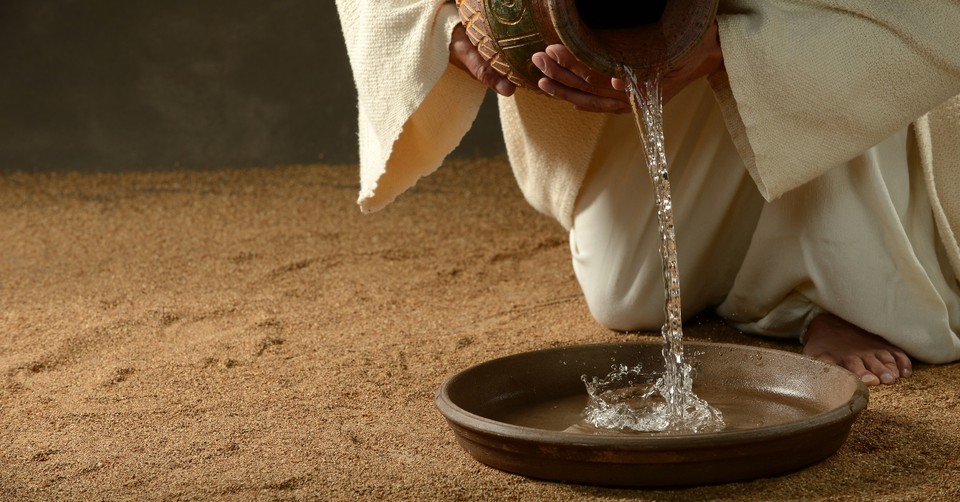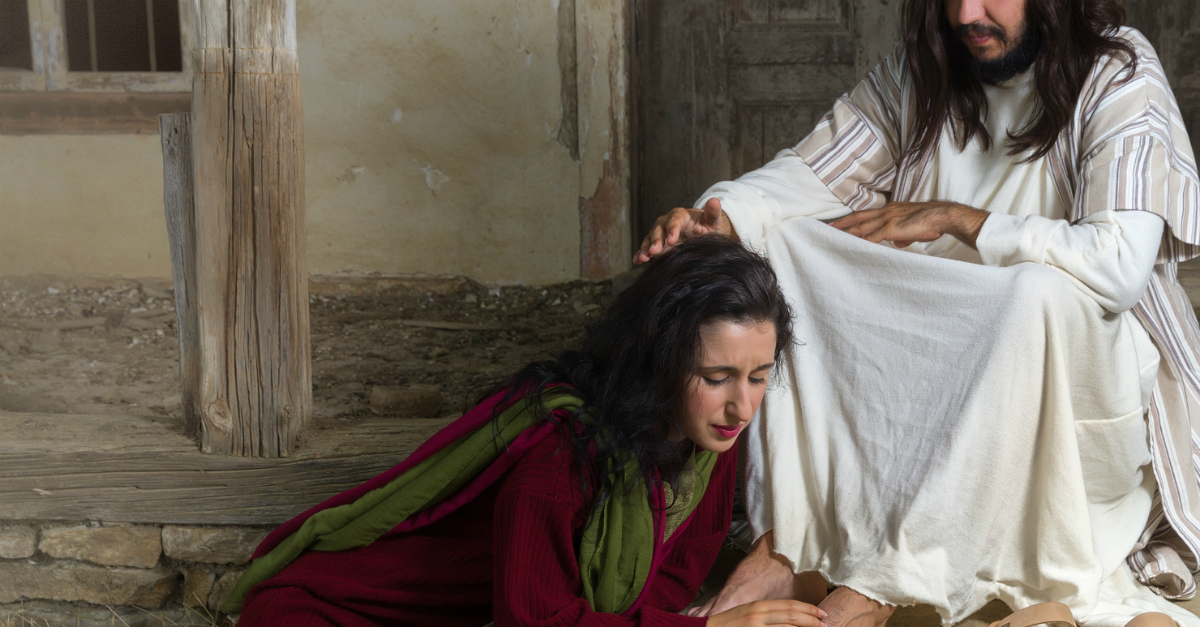3 Lessons We Can Learn from Mary Anointing Jesus' Feet

The Bible story of how Mary anoints Jesus’ feet with perfume (in John 12:1-8) describes wholehearted devotion to a loving God. Mary’s simple action is profoundly significant. By learning why, we can grow spiritually and experience more love in our lives. Here are 3 lessons we can learn from Mary anointing Jesus’ feet with perfume.
Why Does Mary Anoint Jesus’ Feet with Perfume?
The story of Mary anointing Jesus’ feet with perfume is takes place at a dinner in honor of Jesus, at the home of Simon the Leper in Bethany. The woman in the story we’re exploring is Mary the sister of Martha and Lazarus. All three siblings were friends of Jesus. This event takes place shortly after Jesus raised Lazarus from the dead, and about one week before Jesus’ Crucifixion. It’s important to note that this incident is different from the separate events of other women anointing Jesus, which are recorded in Luke 7:36-50, Matthew 26:6-13, and Mark 14:3-9, and are sometimes confused with this story. The story we’re looking at is from John chapter 12.
During dinner as Jesus and the others were reclining at a table, verse 3 says, “Then Mary took about a pint of pure nard, an expensive perfume; she poured it on Jesus’ feet and wiped his feet with her hair. And the house was filled with the fragrance of the perfume.” The perfume was so expensive that “one of his disciples, Judas Iscariot, who was later to betray him, objected, ‘Why wasn’t this perfume sold and the money given to the poor? It was worth a year’s wages’” (verses 4-5).
Jesus’ response in verses 7 to 8 reveals that the anointing foreshadows his upcoming death and burial: “‘Leave her alone,’ Jesus replied. ‘It was intended that she should save this perfume for the day of my burial. You will always have the poor among you, but you will not always have me.”
Mary’s action was an extravagant act of worship that showed wholehearted devotion to Jesus. Mary knew Jesus well and was inspired to honor him. She was glad to sacrifice something valuable in order to express her love for Jesus. Jesus was about to make the ultimate sacrifice – dying on the cross for humanity’s sins to make salvation possible. Looking ahead to what he planned to do for all people, Jesus connected Mary’s anointing to his work as the world’s Savior. The word Messiah in the Bible means “Savior” and comes from the Hebrew word mashiach, which means “anointed one” and “chosen one”. The word Christ comes from the Greek word christos, which means “anointed one”. In biblical times, anointing someone was a sign that God had chosen that person for a particular role. Priests and kings were anointed, and as humanity’s high priest and the ultimate King of an eternal kingdom, Jesus’ anointing points to his role as God’s chosen Savior for the entire world.
The story concludes in verses 9 to 11: “Meanwhile a large crowd of Jews found out that Jesus was there and came, not only because of him but also to see Lazarus, whom he had raised from the dead. So the chief priests made plans to kill Lazarus as well, for on account of him many of the Jews were going over to Jesus and believing in him.” Many other people were recognizing that Jesus truly was who he said he was, and were placing their faith in him.

Photo Credit: ©GettyImages/Studio-Annika
3 Lessons We Can Learn When Mary Anoints Jesus' Feet with Perfume
Here are 3 important spiritual lessons we can learn from the story of Mary anointing Jesus’ feet:
1. God is worthy of our worship. All of us worship someone or something in our lives, according to how we decide to spend our time and energy. Whatever we devote our attention to the most from day to day is essentially what we’re worshiping. This story of Mary’s act of worship shows us that there is no one and nothing more deserving of our worship than God. We need to get rid of any idols in our lives – whoever or whatever we’re giving more attention to than we’re giving God – and make God our top priority in our schedules and decisions. The way we can motivate ourselves to do so is by pursuing God’s wonder. In my book Wake Up to Wonder, I explain research that shows a strong connection between wonder and worship. Encountering wonder inspires us to worship because the more we notice the wonder of God’s work in our lives, the more we’ll want to worship him. The connection works the other way around, as well: the more we choose to worship God, the more we will recognize his wonder and feel awe.
2. God doesn’t hold anything back from us. God loves us completely and unconditionally. This story of Jesus’ anointing foreshadows how Jesus gave his all on the Cross for us. He made the ultimate sacrifice so we can enjoy eternal relationships with God. As John 3:16 says: “For God so loved the world that he gave his one and only Son, that whoever believes in him shall not perish but have eternal life.” There are no limits to what God is willing to do for us, because of his great love for us. God not only has love for us, but God actually is love at his core, as 1 John 4:16 declares: “And so we know and rely on the love God has for us. God is love. Whoever lives in love lives in God, and God in them.” Psalm 36:7 points out: “How priceless is your unfailing love, O God!...”. God is the source of all love, and love that comes from him never fails. God’s unlimited, reliable love is something to celebrate!
3. We shouldn’t hold back anything back from God. In our relationships with God, we shouldn’t hold back our love from God. God is worthy of all our love and he doesn’t hold back his love from us. So, like Mary in this story, we should give our wholehearted devotion to God. Jesus reveals in Matthew 22:37 that the greatest commandment of all is to, “‘Love the Lord your God with all your heart and with all your soul and with all your mind.’” Love is more than an emotion; it’s an action. We often have opportunities to show our love for God through our work, and Colossians 3:23-24 encourages us: “Whatever you do, work at it with all your heart, as working for the Lord, not for human masters, since you know that you will receive an inheritance from the Lord as a reward. It is the Lord Christ you are serving.” Just like Mary did, let’s give our very best to God.
How Can We Apply These Lessons in Our Own Spiritual Lives?
We can apply the wisdom from these lessons by doing our best to pour out our lives as on offering to God, just like Mary poured out valuable perfume to show God her love.
Our attention shows what we value most. Mary’s attention to Jesus reveals that she highly values him. Are we giving our attention first and foremost to our relationships with God? How often do we think of God and communicate with him? Are we reading the Bible – God’s love letter to us – regularly? Have we built prayer and meditation habits we enjoy? How often are we thanking God for his love and the blessings he’s giving us? Are we seeking God’s wonder and celebrating it? Are we approaching worship as more than just a weekly service, but as a constant lifestyle? What are we doing to show God from day to day that we adore him?
Our time is like Mary’s perfume – a highly valuable resource that we should use well. In order to so, we should make our relationships with God our top priority. Do our schedules show that we’re centering our lives on our relationships with God?
Every day, we can ask our Counselor the Holy Spirit (John 14:26) to help us worship God wholeheartedly, without holding anything back. We can base our decisions on the Holy Spirit’s guidance, and then enjoy how doing so welcomes God’s love into our lives.
Conclusion
The Bible story in which Mary anoints Jesus’ feet with perfume powerfully shows love in action. Mary recognized God’s true value and responded to a loving God with loving worship. By looking at Mary’s example of devotion to Jesus, we can find the inspiration we need to fully receive and give love in our own relationships with God.
Photo Credit: ©GettyImages/carlosphotos

Originally published July 01, 2022.





